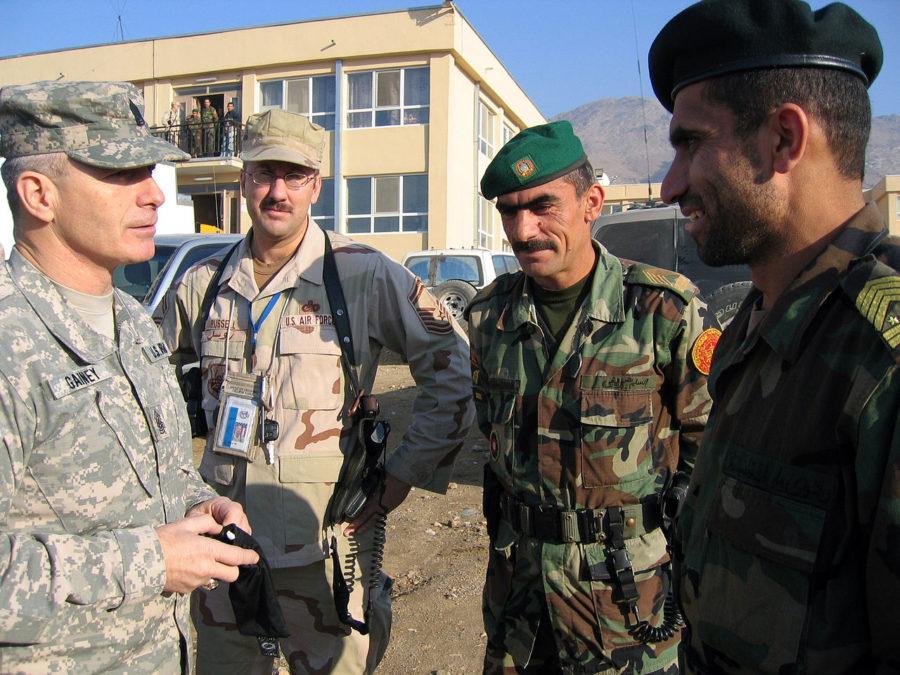As Afghan War turns 18, it remains a background issue for most Americans
American and Afghan service members speak in Kabul, Afghanistan.
October 2, 2019
Since the Sept. 11 attacks in 2001, American troops have been at war.
Individuals can see a parallel of a long, seemingly never-ending war by looking at the Vietnam War to help understand the current Afghanistan War, said Timothy Wolters, associate professor of history at Iowa State.
“Here we are in the Afghan war and it started in 2001; it’s twice as long as what when I was young was [referred to as] ‘America’s longest war,’” Wolters said.
The Taliban and Al Qaeda were involved in terrorist activities even before the United States entered the war after 9/11 attacks, said Richard Mansbach, professor of political science at Iowa State.
“The Clinton administration [was aware] of what bin Laden was doing long before 9/11, they knew of Al Qaeda long before 9/11, in fact they set up a separate branch in the CIA to keep track of this guy,” Mansbach said.
From 9/11 to present time, the war has gone back and forth between terrorists gaining and losing ground.
The United States searched for bin Laden and Al Qaeda forces, at moments having no luck and at moments overthrowing the Taliban and also witnessing terrorist attacks, Mansbach said.
However, a big event in this war happened in 2011.
“Probably the most impressive single foreign policy triumph of the Obama years was the fact that they finally tracked down Osama bin Laden,” Mansbach said.
With the war going on for so many years, one of the key issues leading to students not being as aware of this war is the lack of a draft, Wolters said.
“If you want to serve in the military you volunteer — you’re not drafted, you’re not conscripted — and so I think that has been a strong factor in why Americans don’t pay as much attention, because they are not at risk [of going to war],” Wolters said.
A recent YouGov poll found zero percent of American adults say the war in Afghanistan is the most important issue to them among a list of policy issues.
Sawyer Kochel, a sophomore in open option liberal arts and sciences, served in the Marine Corps from 2014-2018 as a vehicle commander in his platoon.
The draft isn’t needed now because the United States has no need for guys riding horseback in a huge battlefield, Kochel said.
“War’s changed a lot; it’s very tactical, not like it is in the movies,” Kochel said.
Another factor contributing to the disinterest in this war is “elites” not being a part of the ongoing war. Many of the celebrities, politicians, and other public figures students see today wouldn’t necessarily have links to the military as opposed to the past, Wolters said.
“Can you imagine a Kennedy serving in Afghanistan today?” Wolters said.
A contribution to this war’s ongoing status is that outside sources, such as China and Russia, are less likely to interfere with the war as compared to past wars, Wolters said.
“There was a real fear in Vietnam of escalation; what’s interesting about Afghanistan is that fear is not there,” Wolters said.
Although Kochel said he respects and stands behind those who are fighting in the war, he also said he doesn’t think war is a good thing to do.
“War is a nasty business, a nasty thing,” Kochel said.
President Donald Trump would like to get American troops home; however John Bolton, Trump’s former national security adviser, advised against it as it could threaten the conditions on the ground, Mansbach said.
“Bolton wanted to maintain minimally current levels of troops in Afghanistan,” Mansbach said.
With no end date or anticipation of an end to this war, Wolters said it is important to remember those serving.
“I think that the people who volunteer to go and serve our country are American heroes, I really do,” Wolters said. “They deserve all the praise they get.”

















